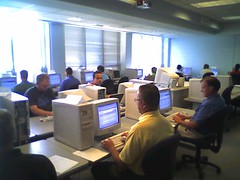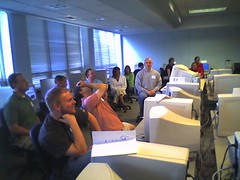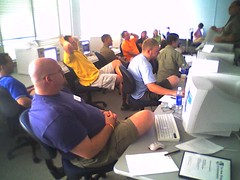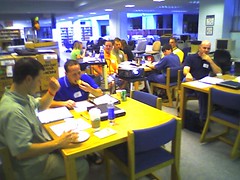I just got home from an exhilarating two-day workshop in suburban Chicago, the Downers Grove Summit. We called it a summit, because the ultimate goal was not necessarily to teach new skills to Downers Grove educators (and education leaders from other area districts), but to help them to negotiate an intersection between the new information environment and 21st century classrooms.
 I arrived back in North Hills about 4:00 AM this morning, so my wits are not quite with me yet (such as they are, they never have far to come). But I have read through a number of the closing blog articles and wanted to share them with you, my seven readers.
I arrived back in North Hills about 4:00 AM this morning, so my wits are not quite with me yet (such as they are, they never have far to come). But I have read through a number of the closing blog articles and wanted to share them with you, my seven readers.
I won’t say that they Got It, because I do not believe that any of us really know yet what It is. However, these teachers have definitely gained the courage to jump off the diving board and start to rethink and redefine what they do in preparing children within todays new information environment.
I am very proud to have been part of this, and many thanks to David Jakes, who asked for it, got it, and contributed tremendously from his perspective as a thinking educators who is close to the lines. Also thanks to Steve Dembo, who was with us during the second day, and shared many new tools and many new ways of looking at things. It is always a enlightening pleasure to work with both of these educators.
…at the Downers Grove Summit I feel more strongly than ever that the success of our educational system in the 21st century hinges on a new way of doing business. The vast amounts of information available is only an asset if our students have the abilities and the understanding to make use of it. They need to be able to find the wheat from the chaff!
Chris Gales at The Wheat from the Chaff
With the emergence of the technologies we’ve been discussing and describing over the past two days I have come to a general conclusion. The way I do my job as a teacher had better change. (snip)
The skill set that is most likely the most important and authentic for my students is that of what has been termed “information literacy”. Students need to know how to find what they want to know. They also need to be able to distinguish the bullshit from the truth. How the hell do I teach them that? In more appropriate language, I ask, “How do I teach my students to be good discriminators (between) misinformation and information”?
Jamie at Concentration Gradient
No longer are the guidance counselor and school catalogs be the only source of information. Students now have the ability to communicate independently and collaboratively while the get information directly from the source, those who lived it.
Bill Gebhards, a guidance councelor at Beyond the Drop Slip
The fact that information can be pushed and pulled in these new ways from so many sources that were not available until recently presents a new set of challenges to educators. My students really are growing up in a world that is connected differently than the one I did. One of the things we strive to do is make connections between what we do in the classroom and the “real worldâ€Â. I wonder if the real world that many of us teachers are connecting to is a different one than the real world our students are growing up in.
Charles Sprandel at Disrupted Equilibrium
What once took place in a card catalog now takes place on the Internet. The new environment won’t change the library – it will expand the concept of a library. People talk about having a “personal digital library,” or “tagging information,” how it warms my heart to hear all this “library talk” out of “regular people.”
I do like the phrase, “information environment” – Maybe that’s what I’ll call the library from now on – the DGN Information Environment.
Rebecca Briskey, a Librarian, at Can ‘o Words
In that first entry I explained my feeling that I have basically grown up with computer technolgy. Everything from the complexity of computer/video gaming to educational applications of technology have evolved at a point in time that seemed to fit pretty well with where I was at (in terms of being a grade school student, high school student, college, and now a high school teacher).
This workshop has exposed me to … “Web 2.0” tools for the first time. I had heard of (them) and had a basic idea of what they were supposed to do but … I became discouraged pretty quickly when I tried to figure it out in the past.
(The Downers Grove Summit) has not only opened the door to these emerging technologies, but … we have been given practical applications and suggestions for directions to explore in. We have been given a set of tools to work with, and some places to start in terms of building our own useful information networks.
Bill Miller at Coffeehouse Ears
These young people live in a technology rich world and are connected in many ways outside of the classroom. These “strange connections” as David Warlick puts it, drive the information consummation of individuals. Simply stated, as educators it is our responsibility to educate students on how to be discriminatory user’s of information.
Ted Glazier at Personal Yardstick
All of the material from the workshop is available through the summit wiki, including information from many of the discussions, and links to participants’ reflective writings (weblogs). The site is at:
http://dgs.davidwarlick.com
(some audio from the summit is on the way)
7030

 I arrived back in North Hills about 4:00 AM this morning, so my wits are not quite with me yet (such as they are, they never have far to come). But I have read through a number of the closing blog articles and wanted to share them with you, my seven readers.
I arrived back in North Hills about 4:00 AM this morning, so my wits are not quite with me yet (such as they are, they never have far to come). But I have read through a number of the closing blog articles and wanted to share them with you, my seven readers.


